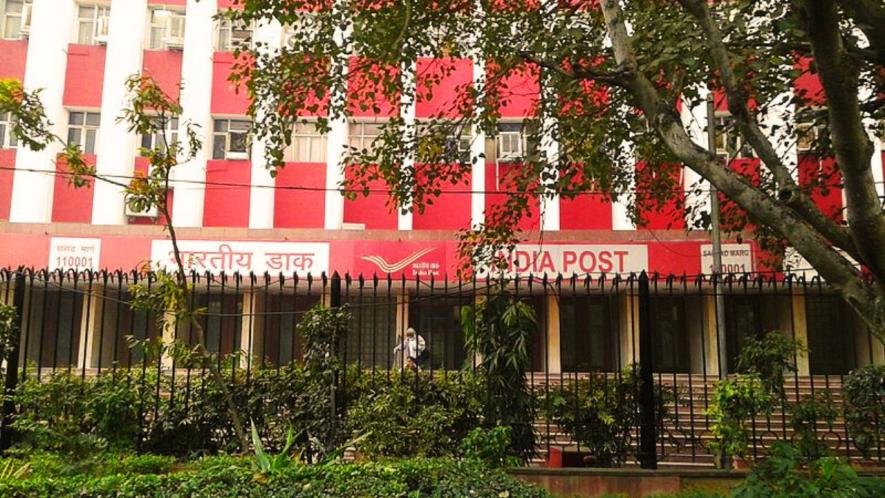How India’s New Postal Policy Marginalises Millions

Image Courtesy: Wikimedia Commons
Education is not just a pathway to individual empowerment but a powerful mode of resistance against inequality and oppression. The government’s recent decision to abolish India Post’s subsidised Book Post service strikes directly at the foundation of envisaging education as a transformative and liberatory public endeavour.
For decades, the Book Post service ensured affordable book distribution, making education accessible to economically disadvantaged communities and fostering a reading culture. Its removal severs a critical lifeline for students, grassroots organisations, and small publishers, thereby pushing knowledge beyond the reach of millions.
The Press Information Bureau release on December 26, 2024 attempts to cover up the real designs in typical doublespeak: that this is a legislative reform after 125 years; that the motto of this exercise is ‘Dak Sewa, Jan Sewa’ with the vision of “Maximum Governance and Minimum Government” and “Atmanirbhar Bharat”. In simple and concise language, it aims to consolidate “one product for one need” and avoids redundancy while promoting ‘ease of doing business’. However, on a closer examination, it is not difficult to recognise the new act as the final nail in the coffin of affordable and accessible postal service.
This is not an isolated policy adjustment but part of a larger neoliberal agenda of privatisation and corporatisation. The systemic destruction of India Post since the days of 1991 LPG (Liberalisation-Privatisation-Globalisation) reforms through the promotion and protection of private courier companies was achieved. This was done with the simultaneous curbs and derecognition of postal employee unions, such as NFPE or National Federation of Postal Employees, on false and flimsy grounds -- be it in 1995 and more specifically as in 2023. More worryingly, this prohibitive policy is all about absolute control, designed to restrict access to knowledge, suppress dissent, and entrench systemic inequities.
Take a look at the specifics of the present decision to abolish the Registered Book Post and consolidate it under Registered Parcel. This is announced in these many words “The Mails and Parcel products are rationalised keeping in view the redundancy of the existing products and optimizing operational efficiency with a vision of having one product for one need, promote ease of working amongst staff and easy understanding amongst the citizens. The features of all the existing products have been subsumed into one umbrella product of each type. eg. Instead of going through subjective classification of various products under book packets at different rate slabs, book packet, pattern & sample packet and book packets containing printed books have been subsumed in one product”.
Yet, it conceals the massive cost escalation (for a book post of 5 kg it goes up from Rs 80 to around Rs 230) completely. Like a dubious salesman, the government machinery shamelessly pitches the new policy and price hike as a “pro-people” decision. However, by dismantling this subsidy, the government advances its project of turning education from a public good into an elite privilege, perpetuating cycles of exclusion and deepening social stratification.
The Legacy Undone
Historically, India’s discounted postal rates for books symbolised its commitment to democratising education. Introduced under colonial laws like the 1837 Post Office Act or the 1898 Indian Post Office Act and reinforced through post-Independence reforms, these subsidies supported the idea that education should serve all, not just the affluent. They made it possible for marginalised groups, Dalits, adivasis, women, and the economically disadvantaged, to access educational materials and break free from entrenched cycles of deprivation.
The abolition of the subsidised rates dismantles this progressive legacy. Millions of students in rural and underserved areas, already excluded from traditional institutions due to financial and geographical constraints, now face another obstacle. Distance education programmes, dependent on affordable postal services for distributing study materials, will become prohibitively expensive. For many, this signals the end of their educational aspirations.
Small publishers, which amplify marginalised voices and challenge dominant narratives, are also imperiled. Operating on thin margins, they depend on affordable postage to distribute critical perspectives that mainstream media often ignore. Increased costs will force many out of business, silencing alternative narratives and consolidating intellectual control. Many of these small publishers are regional language enterprises doing a great fillip to the vibrant multilingualism of our people. This price escalation is an existential threat to them and will adversely affect and impoverish cultural transactions.
This deliberate constriction of access to knowledge harks back to dystopian warnings from literature. George Orwell’s book,1984, depicted a society where power was maintained by systematically strangling critical thought, while Ray Bradbury’s Fahrenheit 451 envisioned a world where books were burned to suppress ideas and dissent. Today, India mirrors these chilling scenarios; not by outright banning or burning books, but by pricing them out of reach for those who need them most.
Reinforcing Inequalities
This policy exacerbates existing inequalities, particularly for historically marginalised communities. Dalits and adivasis, often located in remote areas with poor infrastructure, face mounting hurdles as the cost of accessing books and educational materials rises. Women, especially in patriarchal and impoverished households, are likely to suffer further, as families prioritise limited resources for male members.
Moreover, the assumption that online sources can seamlessly replace physical books is fundamentally flawed. Many remote areas still suffer from low or no internet availability, making access to digital resources unreliable or impossible.
Additionally, the lack of regional language reading material online further alienates non-English-speaking populations, leaving them with even fewer options for learning and self-improvement. For these communities, affordable printed books and materials remain indispensable tools for education and empowerment.
Grassroots organisations, critical to empowering marginalised communities, are also hard hit. Affordable educational materials have been their lifeblood—essential tools for raising awareness and mobilising action. With soaring postal costs, these organisations lose their ability to educate, organise, and resist oppression. This weakens collective movements and deepens the structural barriers that keep marginalised communities at society’s fringes.
The policy signals a retreat from the democratic ideal of education as a tool for equality. Instead, it reinforces the status quo, ensuring that knowledge remains concentrated in the hands of the privileged. By making printed materials increasingly inaccessible, the government widens the gap between those with access to education and those without, pushing marginalised communities further into the periphery.
An Agenda of Control
The removal of subsidised postal rates is more than a financial measure—it is a political act. It aligns with the government’s broader agenda of privatising education, silencing dissent, and consolidating power. By restricting access to books and educational resources, the state undermines intellectual freedom, a cornerstone of democracy.
Privatisation further entrenches inequities, transforming education into a market-driven commodity. Public institutions, once the backbone of affordable education, are systematically dismantled in favour of profit-oriented private entities. The postal hike accelerates this trend, making it increasingly difficult for economically disadvantaged groups to access knowledge.
Independent publishers that provide critical literature challenging power structures and fostering debate are among the hardest hit. By imposing economic barriers on the distribution of such materials, the government effectively suppresses dissent and narrows the intellectual space.
This strategy fits disturbingly well into a pattern of state intervention aimed at controlling narratives. Whether through censorship, bans on critical literature, or now, economic inaccessibility, the goal is clear: to limit the tools of critical thought and suppress alternative perspectives.
Orwell warned of intellectual control through the rewriting of history, while Bradbury depicted a society afraid of ideas. The Indian government now employs these methods covertly, substituting blanket bans and en masse book burning with economic barriers to achieve the same chilling outcome.
Education as Resistance
Education is the cornerstone of resistance. It equips individuals to think critically, question injustices, and imagine alternative futures. By making books economically inaccessible, the government is not just denying access to information but actively undermining the intellectual freedom that sustains democratic resistance.
This postal hike is not a neutral economic adjustment, it is a calculated move to dismantle the democratisation of knowledge. It erects new barriers for marginalised groups, stifles grassroots movements, and erodes the capacity for collective progress.
The implications are dire. A society where education is a privilege, not a right, loses its ability to challenge power, envision progress, and nurture equality. As Orwell warned, a state that controls access to knowledge controls the soul of its people. Similarly, Bradbury’s warning, about a world without books as they get burned, underscores the dangers of a society that suppresses thought and creativity.
A Call to Action
The present decision must be resisted—not just for those directly affected, but for the democratic ideals it threatens. Educators, students, publishers, and citizens must stand united in demanding that education and knowledge remain universal rights, not privileges for the wealthy few.
The fight against this postal hike is a battle for the soul of our democracy. If left unchallenged, it will deepen inequalities, silence critical voices, and erode the foundations of a just and equitable society. Let this moment galvanise us to protect education as a public good and reaffirm our commitment to a future where access to knowledge is celebrated, not commodified. The cost of inaction is not just the loss or invisibilisation of books, but the loss of freedom itself.
Dr. N. Sachin is Associate Professor, Department of English, Dayal Singh College, University of Delhi. Dr. Shirin Akhter is Associate Professor, Department of Economics, Zakir Husain Delhi College, University of Delhi. The views are personal.
Get the latest reports & analysis with people's perspective on Protests, movements & deep analytical videos, discussions of the current affairs in your Telegram app. Subscribe to NewsClick's Telegram channel & get Real-Time updates on stories, as they get published on our website.
























